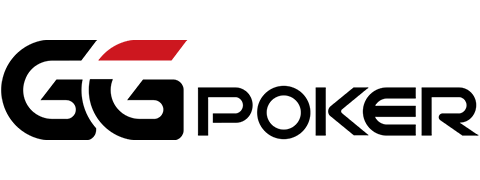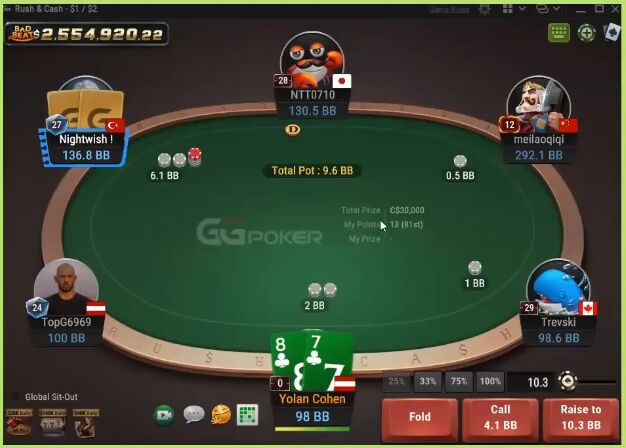
The hands being analyzed were played on GGPoker.
I open from the first position 87s. This is usually a fold, but due to a weak player in the big blind, you can open. I call against a 3-bet.
Flop ($27):
Checks. Your opponent bets $20.
Against a large size, I will fold because the jack is not a clear out. It's more of a gutshot, and with a gunshot, you can't call a big bet.
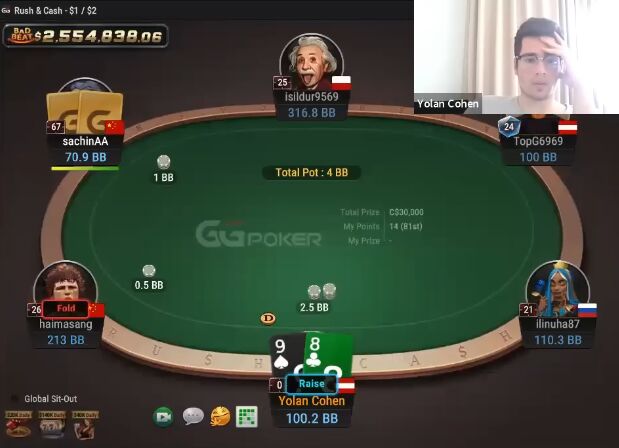
Standard open fold against regs, but against a recreational player in the BB I will raise.
BB calls.
Flop ($11):
The BB leads $5.50. Yolan calls.
Turn ($22):
The BB bets $11. Yolan calls.
River ($44):
BB checks.
I think I always have the best hand here. It seems like I need to check, but I’ll try to make a small bet to get value from a seven.
Bet $13. Your opponent folds.
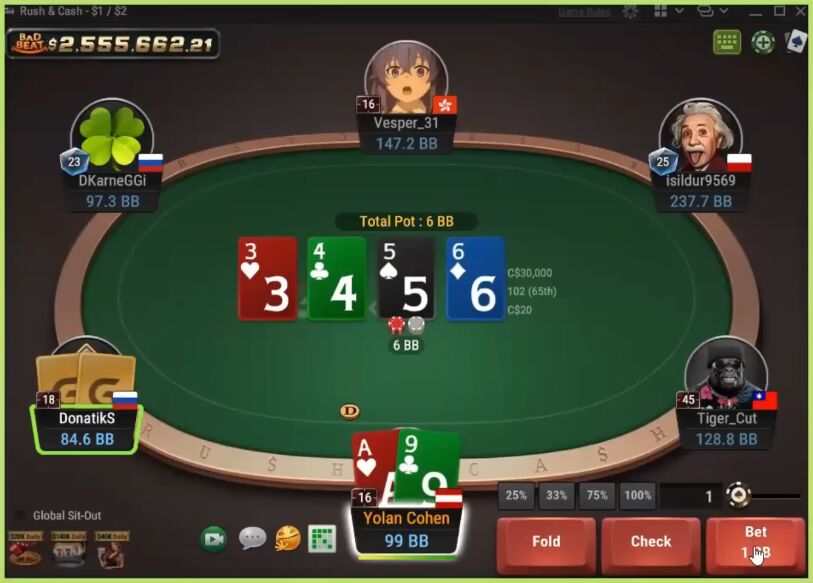
I raised preflop and he called. The flop was played check-check. After he checks the turn, I don't think he has a seven, so I'll bet one blind to get the hands that call the turn and fold the river, and also to prevent him from realizing equity with , , .
Bet $2, opponent folds.
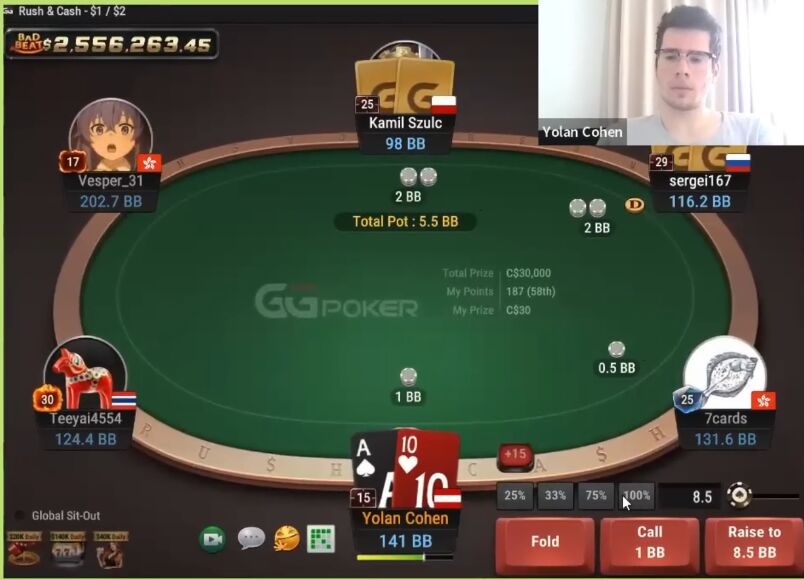
I'll call with ATo, squeezing doesn't seem like a good idea.
Flop ($13):
Everyone checks.
Turn ($13):
I won't lead – my hand plays better through check.
Checks. The cutoff bets $10 and the button folds.
I will raise. Strong flush draws shouldn't have checked the flop. He will often have , , , which are difficult to play against a raise.
Raises to $34, opponent folds.
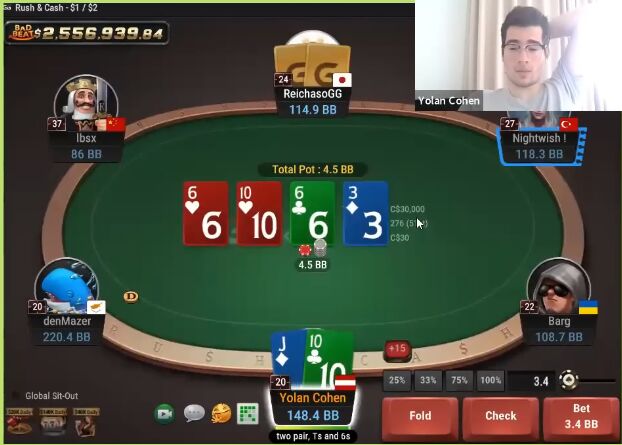
On the flop you can continuation bet, you can check. I like the check a little better.
When he immediately checks the turn, he is very weak, and I already want to draw. I'll make a small bet so as not to give equity to overcards like .
Bet $2, opponent calls.
River ($14):
Your opponent checks.
After he calls my bet, I'm always better. We need to get more. However, I don’t represent much as a big bet and would like to make it with a more polar range. With my hand, polarization is not needed. Let him pay with or something like that.
Bet $6 and get called by .
Interesting! It's a little strange that he not only didn't raise on the turn, but didn't even think about it for a second. His check-call itself is good, of course.
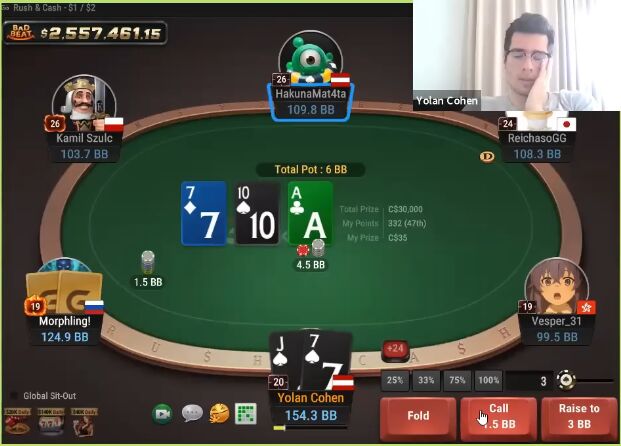
The opponent here has almost a range bet; you can use a variety of sizes, even an overbet. Should I continue, perhaps through a call?
Calls.
Turn ($15):
Check – check.
River ($15):
I think I have two sizings in my strategy here: blocking and 3/4. I'll give it 3/4.
Your opponent folds.
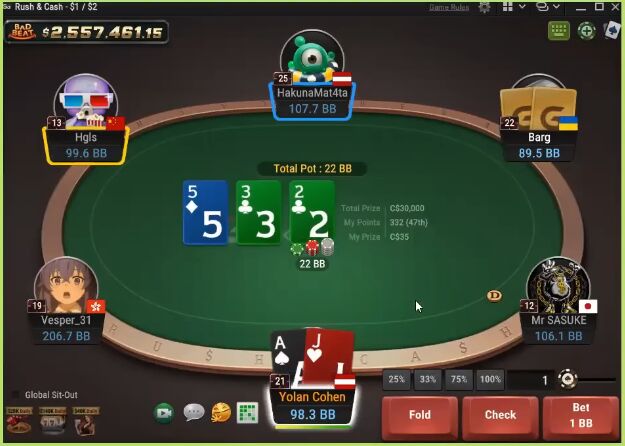
I 3-bet preflop. On the flop, I like to start by checking.
Your opponent checks next.
Turn ($44):
I'll check again. I don't think he's checking enough strong hands on the flop, so if he bets now, I might raise, and if he checks, I might shove on the river.
Your opponent checks next.
River ($44):
Um, the problem is that he has a lot , with which he will very often play such a line. Maybe just bet 3/4? No, that’s also some kind of nonsense. I think with pocket pairs he would have bet the flop or the turn, so I'm either already better or I'm losing. . I could also consider a 15% pot bet, but I don't see much point in it. It's better to check, and if he bets, then you can shove and call with It will be very difficult for him. Although many will still make this call, despite all the difficulties, so the spot for a bluff is not ideal.
Checks. Opponent checks next and loses with .
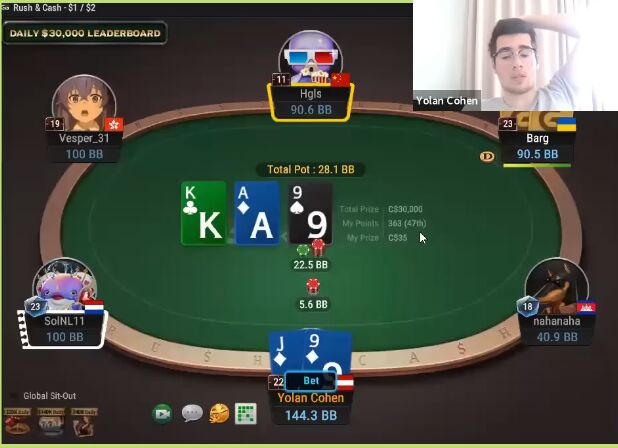
3-bet pot. The strategy here can be built with any sizing. I'll make a small bet.
Your opponent calls.
Turn ($67):
I'll bet two barrels – it must be very difficult for him to call.
Bet $32, opponent folds.
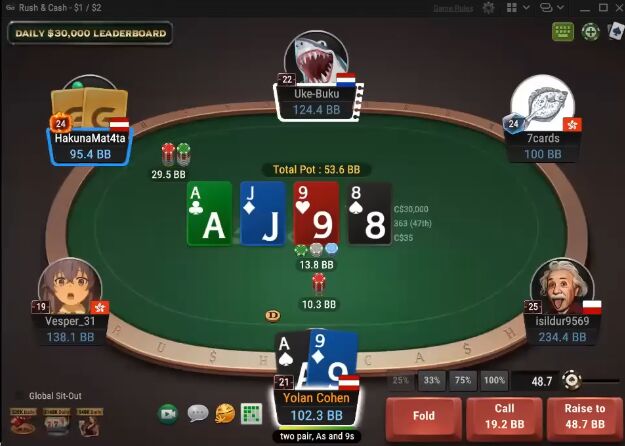
I bet the flop big and get check-raised after the second barrel (I could have checked behind, but the expectation for the bet was a little higher in my opinion). Of course, this is a fold – this is almost always . His range also has , and I don't believe he'll make enough bluff raises with and . A simple fold with two pair.
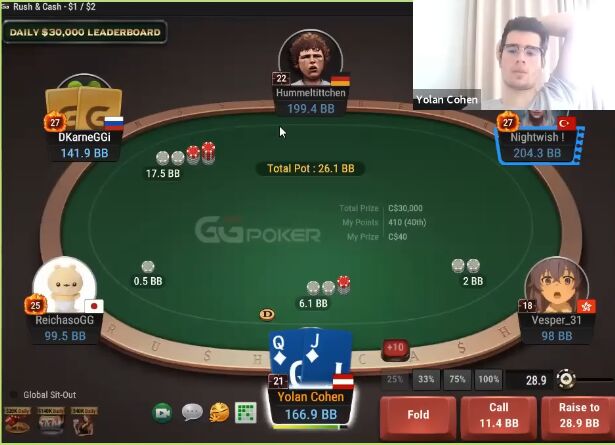
Generally, it should be a fold, but at this depth, I can put a lot of pressure on my opponent post-flop. Okay, I'll call.
Flop ($75):
Your opponent bets $25.
This is a very strong sizing! In principle, it is possible to raise, but it is much better to do this when the ace on the flop is diamonds, so that he does not have and . I'll make a call. This way I can call the turn and fold the river and save.
Turn ($125):
Your opponent bets $45.
There are no bluffs there, so raising is pointless. You have to choose between calling and folding, and folding should be considered seriously, even if it looks insanely nitty. This is a very strong sizing, I would have bet bigger. Maybe I don't have any outs anymore.
Nevertheless, he makes the call.
River ($215, effective stack $214):
Well, the river. Okay, let's see what he does. But if I’m ready to fold all-in, it means the call on the turn is bad, I should have folded.
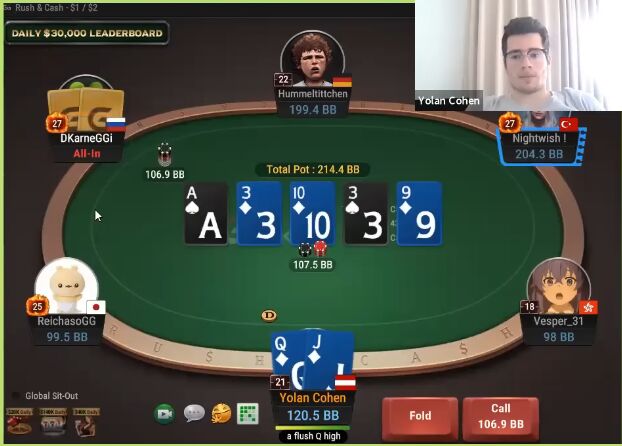
Yes, I'll give up. Absolutely sure that my flush is no good.
Folds open, opponent shows no cards.
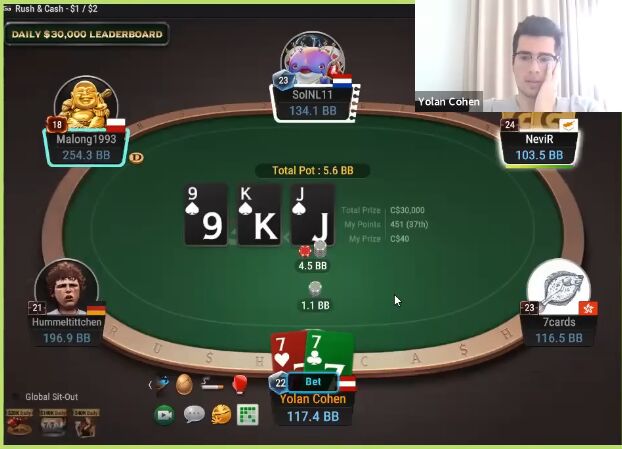
The good thing about a small bet is that opponents usually don't find enough raises.
BB calls.
Turn ($14):
BB checks.
Okay, he called. I need second barrels without spades to bluff the spade runouts otherwise we will under-bluff, but I prefer to bluff with weaker pocket pairs than sevens and check with sevens. And by the way, there is often nothing wrong with under-bluffing, but in this spot people will overfold, so you definitely shouldn’t neglect bluffs.
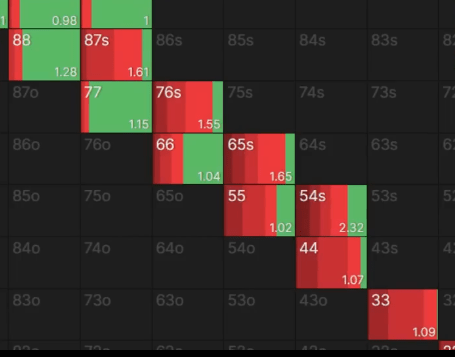
River ($14):
BB checks.
I'll make a very small bet, 1.2 bbs, to knock out , , .
BB calls with .
Everything is fine, I didn’t intend to knock out my hands with a spade, I still like the bet.
When you find yourself in a bluff-catching situation on the river and don't know what to do, I have one piece of advice: if you're on the fence, choose to fold. The way I look at it is that we have a group of hands with obvious positive decisions, others with obvious negative decisions, and some close ones that we need to think about. After a little thought, we identify hands that are not so obvious, but generally quite clear plus or minus decision and call or fold. But the longer we think, the less chance we have of making a rational decision, especially when there are 4-5 seconds left in the time bank. When it comes to the last seconds, and I still haven’t found a strong argument for calling, I always make the most conservative decision.
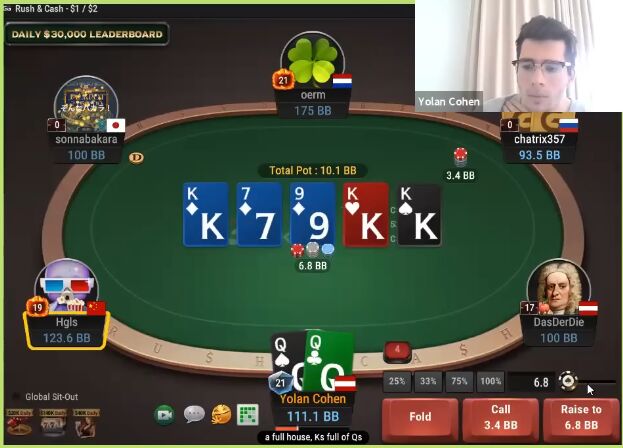
The action until the river is unknown.
With queens, I'll probably call... no, I always have the best hand, I'll make a min-raise, and I'll get a bunch of calls from worse hands.
Makes a min-raise, gets called by .
I probably could have raised bigger, but this sizing seemed great to me and I didn’t have much time to think about it.
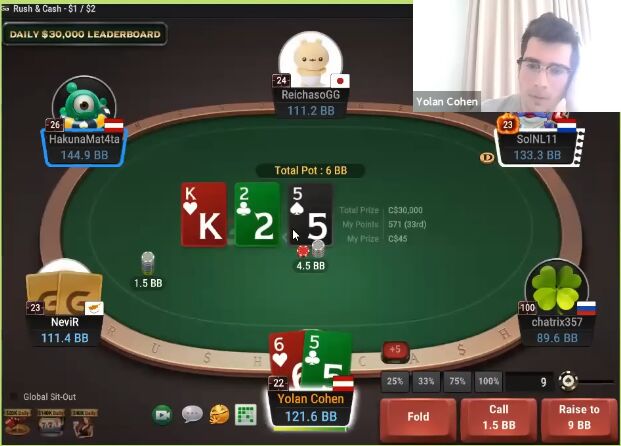
On the flop, I think this hand can be defended. Against a small continuation bet, I should have two raise sizes, but more often I will use a large one.
Raises to $18. Your opponent calls.
Turn ($45):
On the ace I face a quarter of the pot after a check, and 65o is clearly in check-fold range. It's OK. For barreling, we are beating , , .
Check – check.
River ($45):
So-so. If you really want to get more calls, you can bet a quarter of the pot, but this is not optimal. You can even go all-in, but I think a regular overbet will work best here. I'll take bluffs from , , , , .
Bet $70. Your opponent folds.
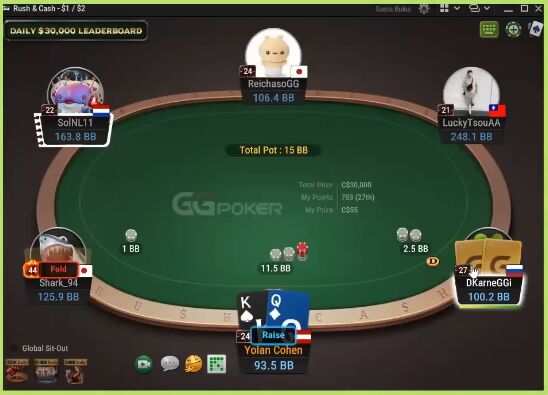
Oh, this is the guy I folded my flush against. I'll try to find out in his chat what he had.
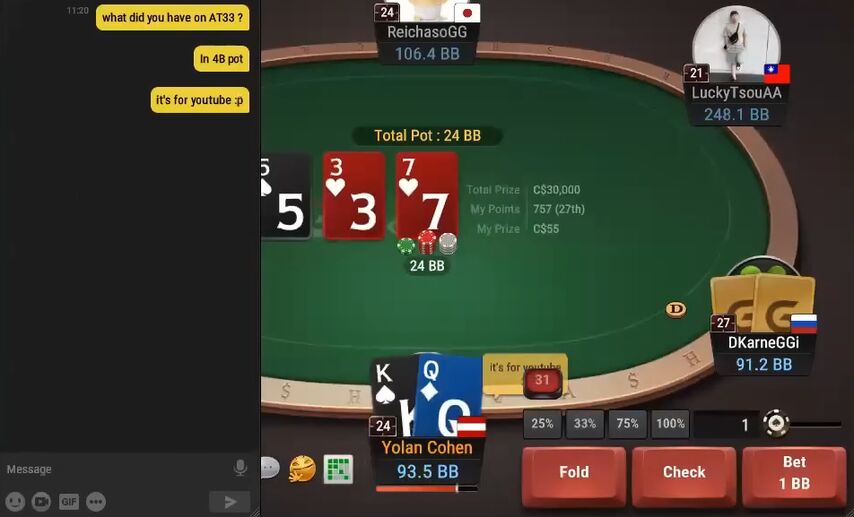
Check – check the flop.
Turn ($48):
The six isn't the best card, but he should have a lot of folds... I'll bet big. With he would usually bet the flop after checking.
Bet $36. The opponent folds and replies in the chat that he had aces in that hand.
I believe this is the most logical hand. Of course, I should have folded on the turn, and I thought about it, but folding with a combo draw is so strange!
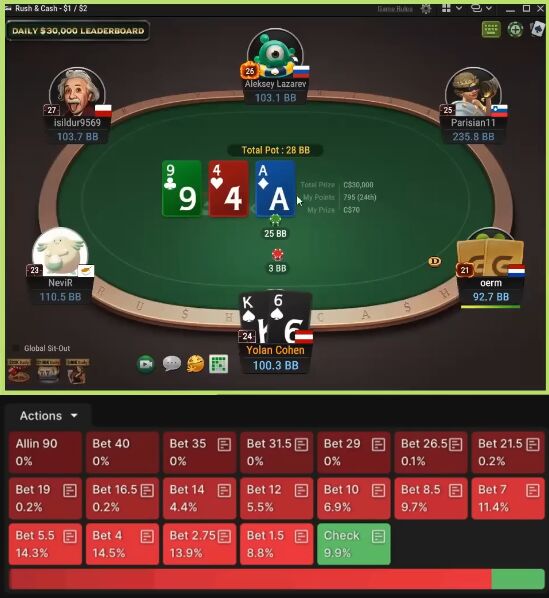
I 3-bet a little loose preflop, but at these limits, you can play like that. If on such a dry flop you ask the solver to choose from a bunch of sizes, it will prefer very small ones, so I’ll bet three blinds.
Your opponent raises to 18.5bb.
He's also terribly tight, 12/21/3. Okay, I'll throw it out.
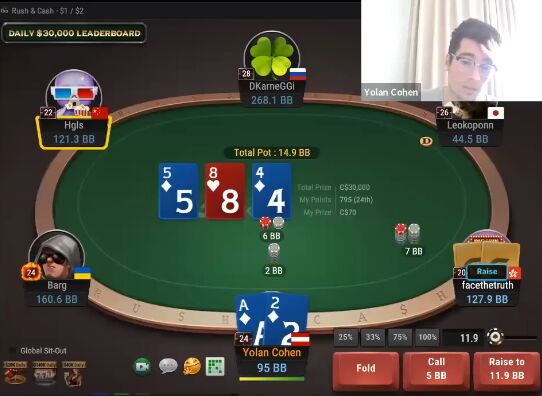
I called the raise preflop. He checked the flop, you can choose from two sizes for me, I preferred the small one. With a check-raise, my opponent shows absolutely nothing, so I'll just move him again.
Reraises to 21.9bb, opponent quickly folds.
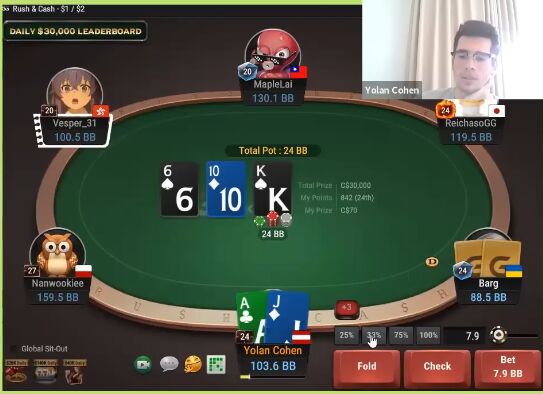
3-bet pot, I put a standard continuation bet, a third of the pot.
Your opponent calls.
Turn ($80):
Interesting turn. I keep barreling.
He bets $54 and his opponent calls.
River ($188, effective stack $107):
To bluff or not? I think so: I block the straight, I don't block the spades, and besides, his now they lose to the bigger pair.
Bet all-in, opponent folds.
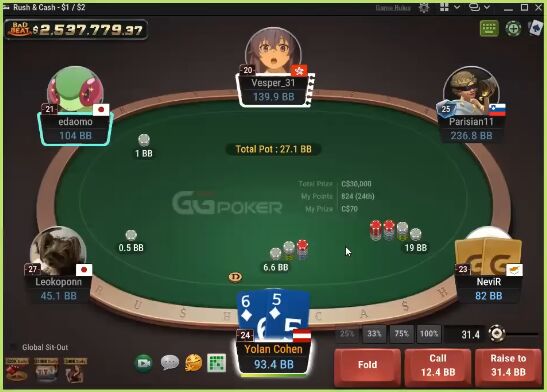
A 4-bet should be called.
Flop ($79):
On this texture, I fold to any size except maybe 10% of the pot.
Your opponent bets $7.
Haha, and he really puts it at 10%! I'm not convinced that this is a +EV call, but I still won't fold it.
Calls.
Turn ($93):
Your opponent bets $9.
How interesting. Okay, call.
River ($111):
Your opponent goes all-in for $146.
“Will you show your hand for YouTube?” – Yolan asks and folds.
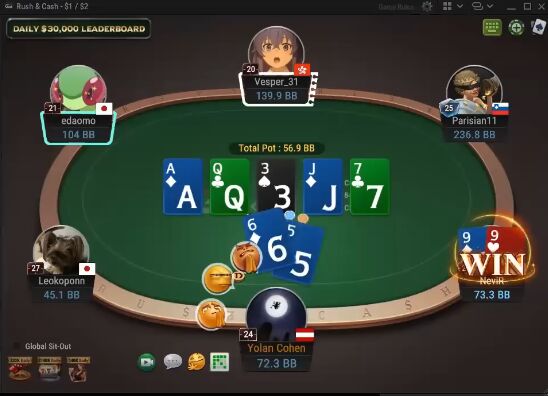
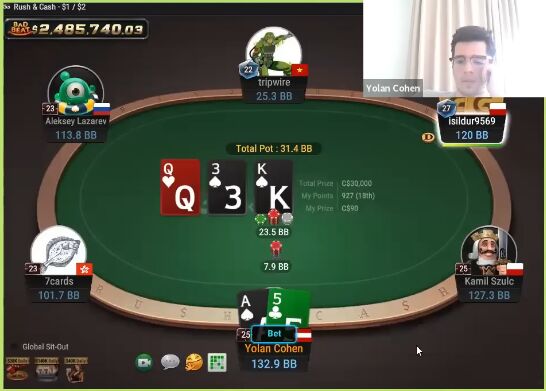
We 3-bet A5o, as the stacks deepen, 3-bet with such hands becomes less, but we can still afford it. There are equal options on the flop; I’ll choose the classic line with a small continuation bet and three barrels.
Your opponent calls.
Turn ($80):
Now the big one...
Bet $60. Your opponent folds.
By the way, it was possible to bet even more, because then he would push generally always, and it will be easier for me to navigate the river.
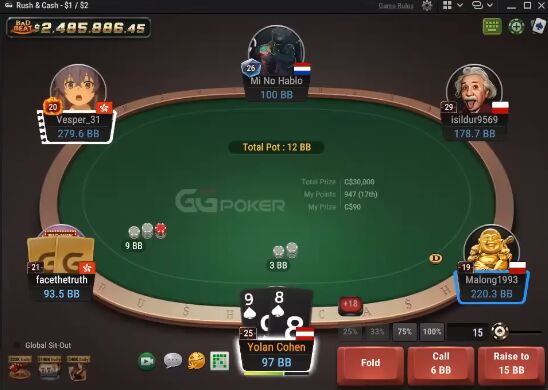
Calls.
Flop ($36):
Check – check.
Turn ($36):
I have some fold equity, but he will call with and slow plays, I don’t think it’s worth betting.
Check – check.
River ($36):
Should he fold all in? and ? I think yes. I'll go all in.
He bets $182, his opponent thinks for a long time, and folds.
Because of my nickname, I sometimes get completely random calls, but in a vacuum, if the opponent knows nothing about you, such bluffs will be very profitable.
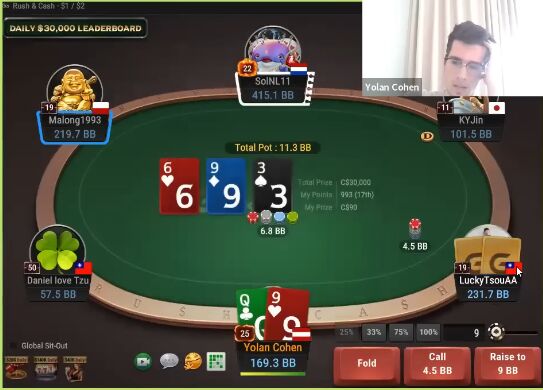
Hmm, tight guy, 19/13. If this is his standard size, then I have a call, if he plays two sizes, then closer to a pass. Difficult spot.
Calls.
Turn ($31):
Your opponent bets $8.
In such a line there are a lot of overpairs to nine – all sorts of kings, jacks... Aces will also play like this, but not often. I think a turn raise and a river all-in looks good for me. That's what we'll do. On the turn, I won't bet very large.
Raises to $42. The opponent thinks for a long time.
If he has a tough call on the turn, it will be even tougher on the river. Looks like I'm definitely going to push.
Your opponent folds.
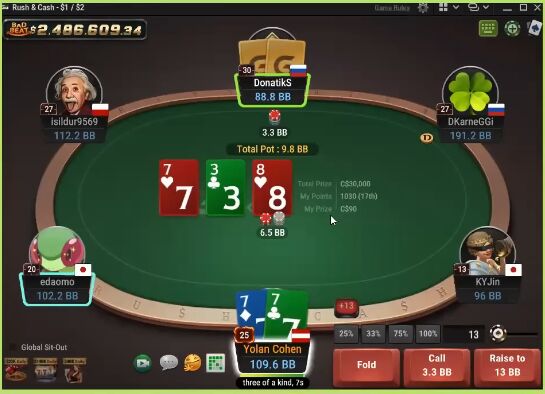
I'll raise. Not very big, 13 bb will be enough.
His opponent calls.
Turn ($65):
I will bet big, but not too much. I'll adjust the SPR to 0.9 or something like that.
Bet $36. The opponent quickly goes all in.
Haha. Well, yes. I never fold hands like these, but we usually don't do very well against all-ins.
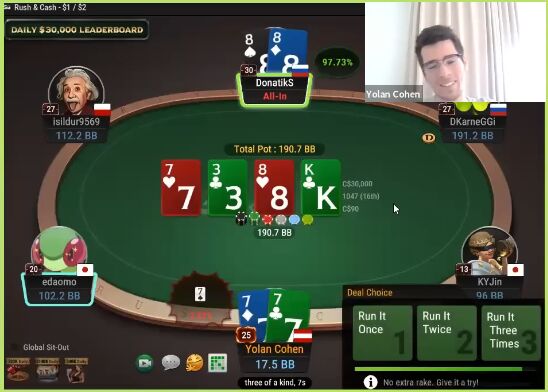
Certainly.
One out on the river didn't come.
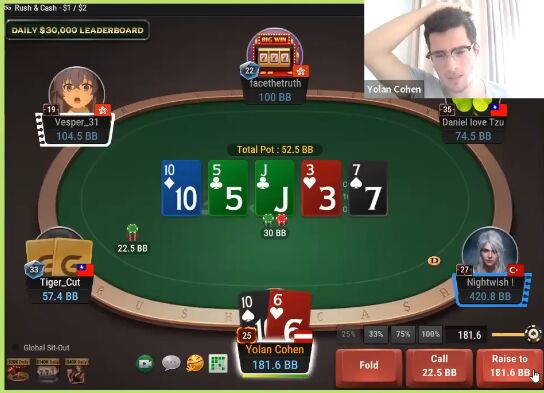
I raised preflop and check-called twice, half the pot on the flop and 3/4 on the turn. Now I can check-push, there are all sorts of things in his range , that will have to fold... although... No, his sizing depicts a stronger hand than , and he has too many two pairs that won't be folded when pushing. Let's change the plan!
Fold.
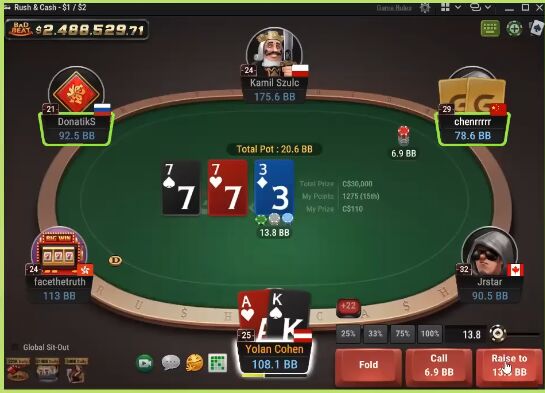
He called the 3-bet and is now leading the flop. I'll check-raise: he won't fold. , , and some KQs with a backdoor flush draw too.
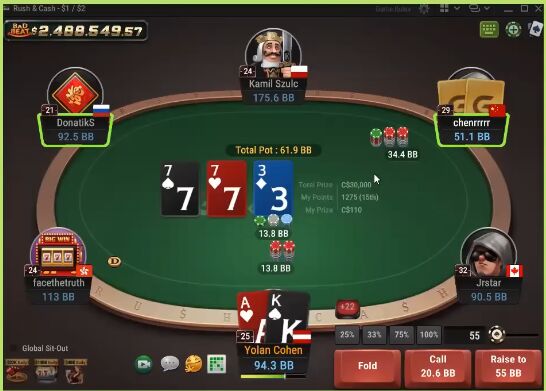
So, I always have the best hand. I don’t want to call, because after my call he might not shove with air, and why give him the realization of equity?
True, there is not so much equity! No, the call looks fine. Although another check-raise would also be nice.
Calls.
Turn ($165, effective stack $102):
The opponent goes all-in.
I still have the best hand. Think for yourself: how many sevens will play along his line?
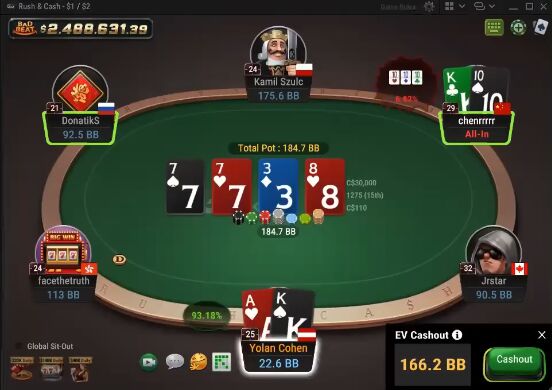
River – .
I hope you enjoyed the video. See you!










